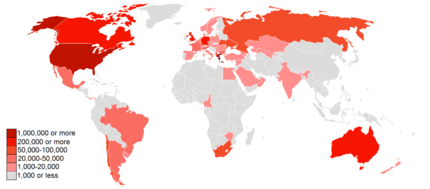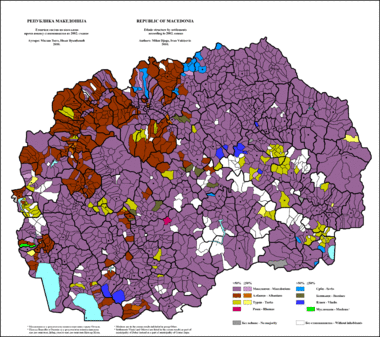Greeks in the Republic of Macedonia
Greeks (Macedonian: Грци, Grci [ɡr̩t͡si]) form an ethnic minority in the Republic of Macedonia, with official figures from the most recent census (2002) citing 422 individuals declaring their ethnicity as Greek.[1] The Greek right wing party Popular Orthodox Rally, claims via questions presented in the Greek Parliament, that there are more than 100,000 (up to 280,000) Greeks that now live in the country.[2] This number is not supported officially by the Greek Ministry of Foreign Affairs. They are a remnant of the formerly much larger Greek community of the part of Macedonia that fell within the borders of the Kingdom of Serbia after the Balkan Wars.[3][4][5][6][7][8][9] Greeks are mainly settled in the cities of Gevgelija (Greek: Γευγελή, Gevgelī́) and Bitola (Greek: Μοναστήρι, Monastī́ri),[10] capital of the historical region of Pelagonia. Today most Greeks in the country are political refugees who fled Greece due to the Greek Civil War [11] and their descendants.[12]
The controversy surrounding a Greek minority within the Republic of Macedonia stems from the statistical treatment of Aromanian (Vlach) population groups, who in their majority have historically identified themselves as Greeks as part of the Rum millet.[13] A large number of Greek-identifying Vlachs left the region after the Balkan Wars, with Florina in Greece witnessing the arrival of a large Greek-speaking commercial population from Monastiri (Bitola).[14] Ethnologue however cites Greek as an "immigrant language" in the Republic of Macedonia.[15]
Representatives of Aromanian Associations of Bitola, Krusevo and Gevgelija take place in the Panhellenic Reunion of Aromanians every year and representatives of Sarakatsani Association of Skopje take place in the Panhellenic Congress of Sarakatsani, every two years.[16][17]
See also
References
- ↑ Stavrova, Biljana; Alagjozovski, Robert (2003-09-12). "Macedonia's census opens new doors". Transitions Online. Retrieved 2008-11-08.
- ↑ "LA.O.S. party question in the Greek parliament signed by Petros Aivaliots". 21 July 2008. Retrieved 2009-05-07.
- ↑ Clogg, Richard (2002). Minorities in Greece: Aspects of a Plural Society. C. Hurst & Co. Publishers. p. 118. ISBN 9781850657057.
- ↑ Roudometof, Victor (2002). Collective Memory, National Identity, and Ethnic Conflict: Greece, Bulgaria, and the Macedonian Question. Westport, Connecticut: Greenwood Publishing Group. p. 90. ISBN 9780275976484. Retrieved 2008-11-08.
- ↑ Yucel, Vedat; Salomon Ruysdael (2002). New Trends in Turkish Foreign Affairs: Bridges and Boundaries. iUniverse. p. 298. ISBN 9780595244942. Retrieved 2008-11-08.
- ↑ Gawrych, George Walter (2006). The Crescent and the Eagle: Ottoman Rule, Islam and the Albanians, 1874-1913. I.B.Tauris. p. 27. ISBN 9781845112875. Retrieved 2008-11-08.
- ↑ Knight, E. F. (2005). Turkey; the Awakening of Turkey; the Turkish Revolution Of 1908: The Awakening of Turkey. Adamant Media Corporation. p. 182. ISBN 9781402188169. Retrieved 2008-11-08.
- ↑ Few, William Preston; William Henry Glasson; John Spencer Bassett; William Kenneth Boyd et al. (1918). "Search for Greek Monastir on http://books.google.com/". The South Atlantic Quarterly. XVII (Durham, North Carolina: Duke University Press). (January to October). Retrieved 2008-11-08.
- ↑ Moore, Frederick (1971) [1906]. The Balkan Trial [i.e. Trail]. Ayer Publishing. p. 254. ISBN 9780405027680. Retrieved 2008-11-08.
- ↑ Cowan, Jane K. (2000). Macedonia: The Politics of Identity and Difference. London; Sterling, Virginia: Pluto Press. p. 118. ISBN 9780745315898. Retrieved 2008-11-08.
- ↑ Pg.440 Minahan, James (2000). One Europe, many nations. Greenwood Publishing Group. ISBN 9780313309847.
- ↑ Koutsoukalēs, Alekos (1998, library of University of Michigan). To chroniko mias tragōdias, 1945-1949. Iōlkos. ISBN 9789604260935. Retrieved 2009-05-07.
- ↑ Roudometof, Victor (1996). "Nationalism and Identity Politics in the Balkans: Greece and the Macedonian Question". Journal of Modern Greek Studies. Baltimore: The Johns Hopkins University Press. Retrieved 2008-11-08.
- ↑ Clogg (2002). Minorities in Greece: Aspects of a Plural Society. C. Hurst & Co. Publishers. p. 153. ISBN 978-1-85065-705-7. Retrieved 2008-11-08.
- ↑ Gordon, Raymond G., Jr. (ed.) (2005). "Ethnologue: Languages of the World, Fifteenth edition". SIL International. Retrieved 2008-11-03.
- ↑ Panhellenic Federation of Cultural Associations of Aromanians
- ↑ Panhellenic Federation of Sarakatsani Associations
|
|---|
| | | | Officially recognised minorities | | |
|---|
| | Other minority groups | |
|---|
| |
|
|
|---|
| Traditional areas of
Greek settlement | |  Map of countries with the largest Greek communities Map of countries with the largest Greek communities |
|---|
| Western and
Central Europe | |
|---|
| | Former Soviet Union | |
|---|
| | Asia | |
|---|
| | Sub-Saharan Africa | |
|---|
| | Americas | |
|---|
| | Oceania | |
|---|
|


